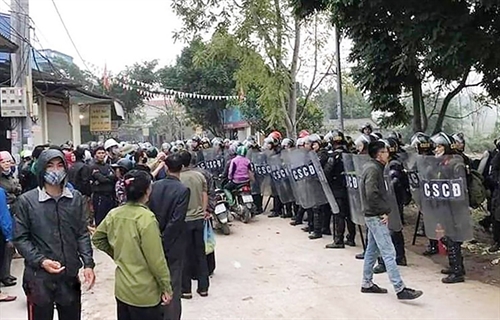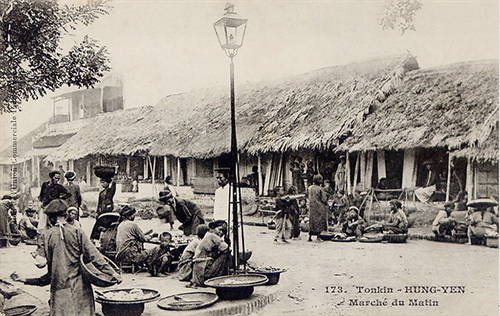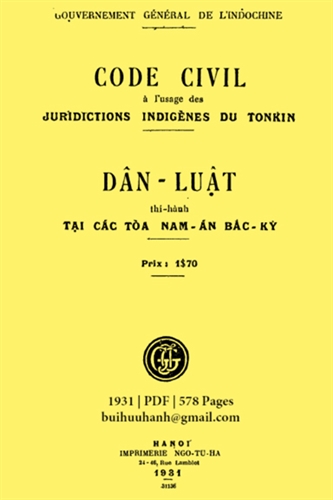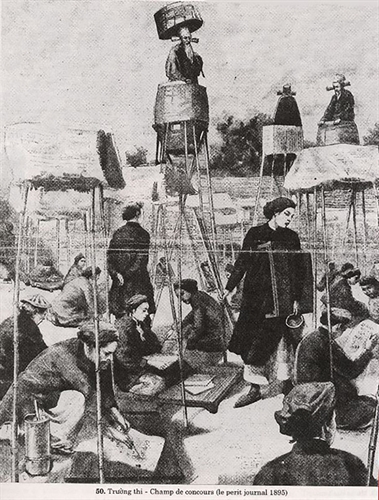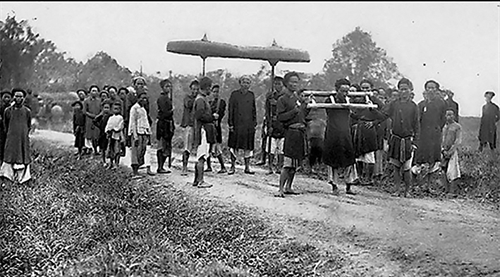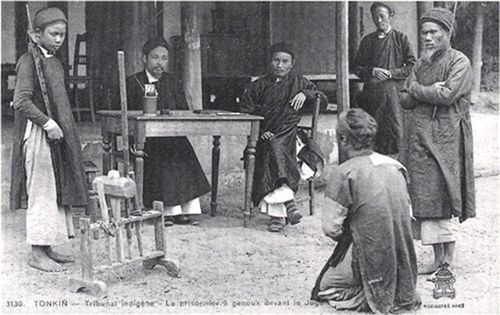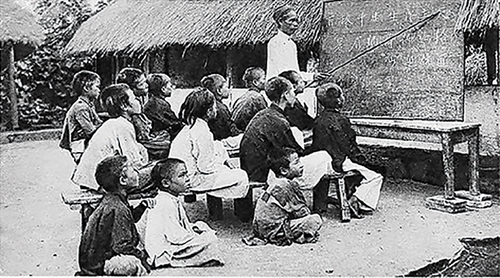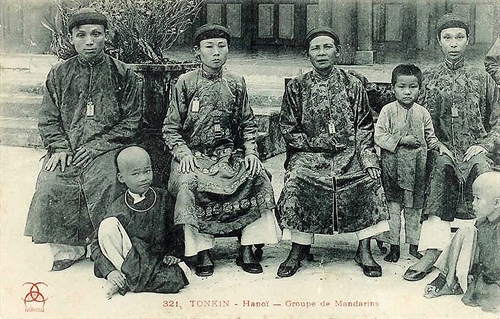Lien Dang Phuoc Hai, LL.M.,[1] and Le Nhu Bao Tran
Guarantee from the comparative perspective
Primary and secondary obligation
Guarantee is one of the first security interests to emerge, even before it was codified in statutes in Vietnam[2]. In judicial history, the Hong Duc Code of the Le Dynasty (1428-1789) is regarded as a legal masterpiece, which continues to influence the Vietnamese people. Compared with the Hoang Viet Luat Le, the Code promulgated by King Gia Long of the Nguyen Dynasty in 1812, the Hong Duc Code represented genuine Vietnamese customs up to the period of French colonial rule and even today, despite the strong influence of Chinese legislation and legal philosophy[3]. Article 590 of the Hong Duc Code stipulated: “If the principal debtor absconds, the guarantor must only repay the principal; in case it is clearly provided in the contract that the guarantor is obliged to pay the debt for the debtor, he must pay like a debtor, and if breaking the law, he shall be punished with 80 rob beatings. If the debtor has children, the creditor is entitled to claim them”. Under this approach, which could be considered the special characteristic of legal spirit of the Le Dynasty, the guarantee can be established by the parties or by law. The guarantee established by law could be seen where the debtor who has children is unable to perform, the guarantor’s children will become the debtors, replacing their parents.
In contrast, the ancient legal system did not provide for the default guarantee of parents for the debts of their children which is also understandable in the context of Eastern society, the family is considered to be the foundation of contracts and obligations, represented by the patriarch. Therefore, the family’s rights and obligations are passed from one generation to the next, i.e., if parents are in debt, their children will be responsible pursuant to the principle “The sins of the fathers will be visited upon the children”.
In general, some bright points tended to preserve the guarantor’s rights. From the verbal perspective, the escape of the debtor could be understood as the failure to perform obligations, in such a case, the guarantor is required to return the whole principals[4]. The term “the debtor” is defined as a person who suffers poverty and the guarantor is entitled to a reserve secondary obligation, therefore, as long as the debtor stays (not yet insolvent), the guarantor is not liable. Further analysis indicates that if the debtor had children, the guarantee obligation would be raised unless the debtor’s children (and grandchildren) were unable to comply[5]. The policy aim of the legislation treats the guarantor as a “backup” debtor, which is a step forward, closer to the spirit of the guarantee stipulated in today’s developed civil codes.
Notably, the Vietnamese ancient law provides greater protection for the guarantor through the scope of the obligations. In accordance with the Hong Duc Code, in case the loan agreement had no clear terms on this matter, the debtor would only bear part of the principal, and the interest rate would not be raised. Particularly, in the absence of explicit agreement on the scope of the security, the liability of the guarantor would be limited to the principal.
In the colonial period, the approach of the 1931 Civil Code of North Vietnam (the 1931 Civil Code), the 1936 Royal Code of Central Vietnam (the 1936 Civil Code), the 1883 Summarized Cochinchina Code, and case law were heavily influenced by the French Civil Code[6]. Initially, there were some significant points in protecting the guarantor as provided in Article 1499 of the 1936 Civil Code. The guarantor, when required to perform the guarantee obligation, did not need to take the initiative to invoke his status as a secondary obligor, but the Court would, upon receiving the petition from the beneficiary, put the guarantor in the status of a standby obligor such as (i) bringing the debtor into the case and proceeding the procedure to force him to pay the debt; and (ii) taking measures to prevent the dispersal of the guarantor’s assets during the time of handling the guarantor’s assets[7]. In the 1931 Civil Code, the guarantor may require the creditor to first enforce the debtor’s property and then execute it himself (Article 1317 of the 1931 Civil Code). If the debtor’s assets are not enough to fulfill his obligation, the guarantor is required to pay the outstanding part (Article 1318 of the 1931 Civil Code).
 |
| The latest Civil Code of Vietnam was promulgated in 2015__Photo: VLLF |
Subrogation of guarantor
After the guarantor has performed its guarantee obligation on behalf of the obligor, the guarantor is entitled to recover money paid from the debtor and receive contributions from joint guarantors. Also, the guarantor has a subrogation from the obligee in the principal obligation relationship, this is the creditor’s subrogation right to the collateral and other certain rights. Subrogation is considered a principle enshrined in the theory of equity. This is a principle established to avoid unjust enrichment from the guarantor[8]. According to the principle of subrogation, the guarantor can take the place of the creditor to request the obligee to exercise its rights similar to those of the creditor. The subrogation will be treated as a creditor through a transfer of claim rights[9]. After subrogation, the guarantor will entirely replace the obligee related to the debtors, other creditors, and the secured property.
In Vietnam, this rule is recognized in the Civil Codes of the contemporary period. In general, the Civil Codes recognize the subrogation of the guarantor after the performance of the guaranteed obligation. Specifically, any guarantor who has paid a debt to the debtor may enjoy the creditor’s rights as well as the security right attached thereto.
After performing an obligation for the obligor, the guarantor has the right to demand reimbursement within the scope of the obligation it has performed on behalf of the obligor; in addition, the guarantor may also charge the relevant fees. According to Article 1321 of the 1931 Civil Code and Article 1503 of the 1936 Civil Code, a guarantor who pays a debt on behalf of the debtor has the right to force the debtor to pay back the amount he has paid, along with interest from the date of payment, any expenses incurred and, sometimes, compensation.
Protection of the guarantor in modern Vietnamese law
Guaranteed obligation as a joint and several obligations
In Vietnam, guarantee is considered one of the security interests under the Civil Code. The relationship between the guarantor and the beneficiary is understood as an undertaking made by a third person, called the guarantor, to an obligee, called the creditor, to perform any obligation on behalf of an obligor, called the principal debtor, if the obligation falls due and the principal debtor fails to perform or performs incorrectly the obligation (Article 335.1 of the 2015 Civil Code). This implies that the guarantee relation between the guarantor and the principal debtor is regarded as a joint and several obligations toward the obligee, which provides better protection for the secured creditor (beneficiary), specifically as follows:
Firstly, the obligee is not required to prove to the guarantor that the obligor is incapable of performing the obligation. Thus, as long as the obligor fails to perform or performs improperly the guaranteed obligation, the obligee has the right to request the guarantor to perform the guaranteed obligation in lieu of the principal debtor. As such, the guarantor is not entitled to invoke issues of the principal debtor’s capacity to refuse to perform the guaranteed obligation unless otherwise agreed by the parties. The parties may agree that the guarantor will only be obliged to perform the obligation if the principal debtor is incapable of performing it (Article 335.2 of the 2015 Civil Code). The above analysis shows that the approach of the current law has transformed the role of the guarantor, which was originally a reserve obligor, into the main obligor when the principal debtor fails to perform its obligation as committed.
Secondly, it is about the performance of joint obligations between the guarantor and the principal obligor. Previously, the 2005 Civil Code prescribes that if the obligee exempts the guarantor from executing obligations, the debtor’s obligation remains unchanged. However, the 2015 Civil Code stipulates the exemption from performance of the guaranteed obligation as follows: Where the guarantor has to perform the guaranteed obligation, but the creditor discharges the guarantor from an obligation, the principal debtor is discharged from performance of the obligation concerning the creditor, except where it is agreed or provided by law. Such an approach could be understood that by exempting the guarantee from fulfilling responsibilities, the obligee’s obligations to the guarantor are likewise removed. By applying the concept of fulfillment of the joint and several obligations, legislators have indirectly acknowledged the “connection” between the guarantor and the obligor. In fact, according to the joint obligation, an obligee designates one person among the joint obligors to perform an entire obligation and later releases that person, and then other obligors will also be released from performing the obligation. As a result, it is plausible to presume that Vietnamese law views guarantee in terms of the guarantor’s and obligor’s joint and several duties. This approach is supposed to be unreasonable because the waiver of the guarantee obligation can only extinguish the guarantee obligation, a subsidiary and reserve obligation, but cannot terminate the primary obligation.
Transfer of the rights from the guarantor
The obligation that the guarantor must perform on behalf of the principal obligor is not part of their obligation, so they [the guarantor] must have the right to demand the real obligor (principal) perform their obligation[10]. Pursuant to Article 340 of the 2015 Civil Code, each guarantor may require the principal debtor to indemnify the guarantor to the extent of the guarantee, unless otherwise agreed. To the extent that reimbursement may be claimed, the law expressly states that the guarantor is entitled to require the obligee to perform an obligation against him to the extent that the guarantee obligation has been performed[11]. Thus, if the guarantor has performed an obligation on behalf of the obligor, the law allows the guarantor to request the obligor to perform the obligation toward him within the scope of the guaranteed obligation. However, the subrogation of the guarantor upon the performance of the obligation is unclear even though the guarantor is entitled to the same rights as the obligee (original creditor) to the principal obligor. It is also noted that Article 368 of the 2015 Civil Code provides for the transfer of the right to request a security interest for the performance of an obligation. Accordingly, “where a right to demand the performance of a secured civil obligation is transferred, the transfer of the right to demand shall include the security”[12]. Nevertheless, the transfer of the right to claim can only be done according to “agreement”, not referring to a statutory case such as a guarantee.
On the other hand, it is not clarified in terms of the consent of the obligor in the guarantee relationship in Vietnam. There is a reasonable perception that guarantee is a legal relationship formed by the mutual consent of the guarantor and the obligor. The guarantor does not necessarily play a role in the conclusion and performance of the guarantee contract[13]. Thus, if the guarantor commits to perform the obligation on behalf of the obligor, in the case after the performance of the obligation, the question arises whether the obligor must repay the debt back to the guarantor in this case. However, whether, in the case of reimbursement, to what extent the obligor is liable to repay, as well as whether there are measures to defend the guarantor, does not seem to have resolved the issue in the 2015 Civil Code.
Recommendations
As could be seen, the current regulations in Vietnam are tended to prioritize protection for the obligor and the secured party, while efficient protections for the guarantor are still absent. It is essential to regulate the protection of the guarantor since the debtor might evade responsibility, hence, the rigor in the agreement would decrease gradually since the risks are transferred completely to the guarantor. Without the necessary institutions to guarantee the right of recovery of the guarantor, it is difficult for the guarantor to request the obligor to reimburse the expenses which the guarantor has spent to perform the obligation. From a comparative perspective, many defense mechanisms for the guarantor against the obligee are established. To promote the development of the relationship of guarantee for the performance of obligations, the authors have some suggestions.
Firstly, the mechanism of reserve obligations for the guarantor should be recognized. From a comparative perspective, the guarantee undertaking is regarded as a secondary obligation which is considered a backup measure. Thus the obligor could be required to perform the debt payment obligation on behalf of the obligee in case the obligor is unable to fulfill his payment. This solution will be consistent with the principle of “good faith, honesty” which is one of the fundamental principles of civil law. It is not reasonable if the obligor is fully capable of performing the obligation but has no goodwill to perform it and forces the guarantor to perform on its behalf. As a secondary obligation, the guarantor should be the last to perform the obligation after the obligor is unable to perform its obligation.
Secondly, the establishment of a joint obligation status between the guarantor and the obligor is not suitable. Not always, a person in charge of guaranteeing a debt for another person has awareness of the legal consequences of the guarantee. Indeed, at an early time, guarantees arises from family and friend relationships. Entering into a guaranteed contract is a subsidiary procedure that creates favorable conditions for the debtor in the transaction and in almost cases, the guarantor wishes not to be a call for the performance of obligations for the debtor[14]. When making comparison, there is a common principle worldwide that the guarantee undertaking must be clearly expressed in a written form. In Vietnam, these requirements are not found in the current Code while the guarantor is responsible for the entire obligation unless otherwise agreed. As a result, in the absence of a settlement, establishing a joint guarantee by law appears to be unreasonable.
Thirdly, provisions on the range of costs that the guarantor may recover should be revised.
According to the 2015 Civil Code, after fulfilling the main obligation, the guarantor cannot receive more than what he has paid to the obligee, specifically: “…may be fully or partly secured, as agreed or as provided by law. If there is no agreement on or if the law does not provide, the scope of the security, the obligation, including the obligation to pay interest and to compensate for any damage, shall be deemed to be fully secured”. The general rationale behind this provision is to prevent the guarantor from reaching an agreement with the creditor (the obligee) to have the interest for their payment. For instance, the guarantor can take advantage of its position to pressure and only agree to pay the creditor less than the debt repayment obligation, thereby still requiring the debtor to return the entire amount according to the main contract[15]. Such approach is intended to protect the secured obligor from the guarantor’s enrichment[16]. Civil codes of developed countries worldwide agree to give the guarantor the right to charge the principal obligor late-payment interest from the time of payment to the guarantor. Therefore, it is such a helpful reference to Vietnamese law to ensure the obligations of the parties.
From a comparative standpoint, the approach of Vietnamese ancient law and foreign experience on the guarantor protection appears to have built a fair solution for the parties, which also clarifies issues related to subrogation right and the scope of the claim that the guarantor can exercise, upon completing the guarantee obligation, including the associated security interests to the creditor and other costs to protect the guarantor’s best interests. These are suggestions that Vietnam may refer to and execute efficiently, utilizing adjudication to establish a balance between the parties in the guarantee relationship, ultimately contributing to the completion of the legislation on guarantee in Vietnam.-
[1] University of Economics and Law, Vietnam National University - Ho Chi Minh City; email: haidp@uel.edu.vn[2] Pham Duy Nghia, Giao trinh Luat kinh te, People’s Police Publishing House, 2015, p. 447.[3] Ta Van Tai, The Status of Women in Traditional Vietnam: Studies in East Asian Law, Vietnam: Number One, Harvard Law School, p. 100.[4] Nguyen Ngoc Dien, Mot so suy nghi ve bao dam thuc hien nghia vu trong luat dan su Viet Nam, Youth Publishing House, 1999, p. 27.[5] Nguyen Ngoc Dien, lbid.[6] Ngo Huy Cuong, Su anh huong cua phap luat Phap toi luat tu cua Viet Nam o Viet Nam, The Journal Of Legislative Studies, e-version, No. 12 (316), accessed on March 10, 2023, available from: [http://lapphap.vn/Pages/tintuc/tinchitiet.aspx?tintucid=208600].[7] The security interest is regulated in Articles 1493 thru 1511 of the 1936 Civil Code.[8] James Morfit Mullen, The Equitable Doctrine of Subrogation, Maryland Law Review, No 3, 1939, p. 201.[9] Brian D. Hulse, After the guarantor pays: the uncertain equitable doctrines of reimbursement, contribution, and subrogation, Real Property, Trust And Estate Law Journal, No. 51, 2016, p. 64.[10] Nguyen Ngoc Dien, lbid, p. 89.[11] This leads to the fact that it can be understood that the content of the right to claim may come from the performance of a job without the authorization of the guarantor, and it is possible that the guarantor is the subrogation of the guarantor (Nguyen Ngoc Dien, lbid, pp. 74-77).[12] In practice, there are cases where the trial court recognizes the enjoyment of the guarantor’s right to security measures as the obligee (Judgment No. 497/2008/DS-PT of May 21, 2008, and Judgment No. 1061/2007/DS-PT of September 14, 2007, of the People’s Court of Ho Chi Minh City).[13] Nguyen Ngoc Dien, lbid, p. 20.[14] Nguyen Ngoc Dien, lbid, p. 58.[15] Michael H. Rubin, Ruminations on Suretyship, Lousiana Law Review, No. 57 (2),1997, p. 587.[16] Bui Duc Giang, lbid.
